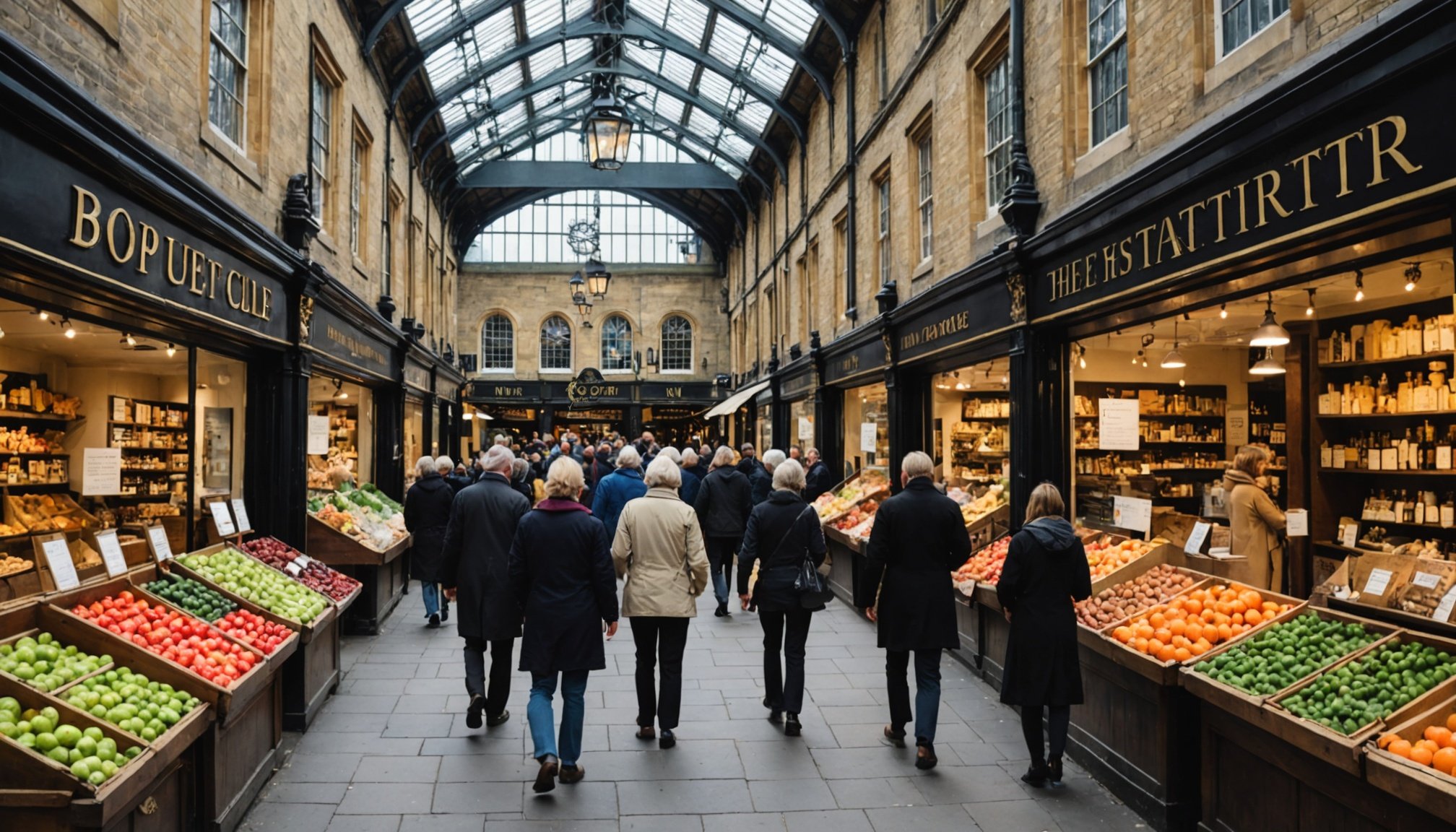Overview of Iconic UK Marketplaces
The historic UK marketplaces are a treasure trove of culture and history, each with its unique story and charm. Dating back centuries, these marketplaces played pivotal roles in local economies and the social fabric. Cultural significance is deeply rooted in these bustling hubs, found in cities like London, York, and Edinburgh. Whether it’s the vibrant Borough Market in London or Shambles Market in York, each location offers a glimpse into the past while remaining relevant today.
These markets aren’t just for buying and selling goods; they’re vital cultural centres where traditions are shared and celebrated. The architecture, from medieval stalls to contemporary designs, reflects the evolution of British commerce and society. Visitors can appreciate both historical and modern influences seamlessly coexisting.
Topic to read : Discover the Heart of Scottish Heritage: Best Spots for Traditional Storytelling in the Highlands
Guided tours can significantly enrich the experience of visiting these marketplaces. Knowledgeable guides provide context, illuminating the stories behind historical landmarks and cultural practices. This enhanced understanding allows visitors to appreciate not just the products but also the ambience and traditions that define these spaces.
Incorporating guided tours into your market visits ensures a comprehensive exploration of what makes the UK’s marketplaces truly iconic. With each step, you’ll uncover the layers of history and culture that have shaped these unique venues over centuries.
Additional reading : Discover the Best Places in the UK to Master Traditional English Hedgelaying Techniques
Popular Guided Tours of UK Marketplaces
Exploring UK marketplaces through guided tours provides an immersive experience, tailored to a variety of interests. Whether you’re intrigued by history, culture, or cuisine, options abound.
Types of Guided Tours
Historical tours lead visitors through time, offering insights into the marketplace’s evolution. These tours emphasize the architectural marvels and significant past events intertwined with the marketplace’s fabric. Many offer both in-person and virtual options, accommodating different preferences and accessibility needs.
For those keen on culinary delights, specific guided tours explore local flavours and the food heritage of the area. These tours often include tastings, allowing participants to savour local specialities while learning about their origins and preparation methods.
In-Person vs. Virtual Tours
Choosing between in-person and virtual tours largely depends on personal preference and current travel restrictions. While in-person tours provide a tactile experience and direct interaction, virtual tours offer flexibility and convenience. Virtual options often use high-quality video and live guides to bridge the gap, ensuring an engaging experience regardless of distance.
Recommendations for Enthusiasts
- Historical Enthusiasts: Seek out tours focused on the landmark structures and pivotal marketplace events.
- Culinary Aficionados: Opt for tours offering comprehensive tasty experiences.
- Cultural Buffs: Look for tours that highlight local traditions and artistic expressions within the marketplace.
Detailed Itineraries for Marketplace Tours
Designing an engaging tour flow with well-thought-out experience design is crucial for memorable market visits. Each day on this itinerary offers plenty of potential discoveries, fitting in bustling activities with room for spontaneous explorations.
Day 1: Exploring Camden Market
Camden Market bursts with energy and vibrancy, a perfect start to your exploration. Begin your day admiring quirky fashion stalls and vintage stores; they offer some of the city’s most unique pieces. Allocate time to savour diverse street food—a culinary adventure across continents! The itinerary highlights must include a stop by the local artists’ outlet. Here, you can appreciate the creativity of crafts that capture Camden’s eclectic spirit.
Day 2: Discovering Borough Market
Day two centers around Borough Market’s historic food haven. As soon as it opens, indulge in a gourmet breakfast from one of the artisan bakers. Spend your morning sampling fresh produce and decadently crafted goods, engaging with passionate traders who shape the market’s essence. By midday, enjoy traditional British fare for lunch, set against the backdrop of lively market chatter. Consider the time allocation to join a guided tour, gaining insights into the market’s storied past.
Day 3: Visits to Portobello Road Market
Perfect your final day with Portobello Road Market’s kaleidoscope of antiques and fashion. Prioritize visits to iconic vintage stalls; they present a glimpse into London’s evolving styles. Seasonal markets pepper this route with special events, ideal for collectors and enthusiasts. Conclude with a leisurely cafe stop, reflecting on the market’s vibrant patchwork.
Historical Context of Key Marketplaces
The historical significance of marketplaces goes beyond mere commerce—these hubs have been the heart of communities for centuries. Each marketplace, with its rich cultural heritage, offers a glimpse into the evolution of trade practices worldwide.
A Brief Account of Marketplace History
In ancient times, marketplaces were more than trading spots; they were vital social centers where news spread and cultures mingled. For example, the Grand Bazaar in Istanbul, dating back to the 15th century, remains a vivid testament to an era when the East and West converged through bustling trade routes.
Contribution to Local Economies and Communities
Marketplaces historically fueled local economies by providing platforms for artisans and farmers to sell their goods, thus sustaining livelihoods. They were also spots where cultural heritage thrived through the exchange of handicrafts and regional specialties. This dynamic fostered a sense of community and interdependence, making marketplaces pivotal in societal structures.
Evolution of Shopping and Trade
The evolution of trade in these marketplaces is marked by adaptability. From medieval fairs to modern-day markets, they have continually transformed, integrating new technologies and practices. Today, while physical marketplaces still enchant, e-commerce has expanded the boundaries of trade, reflecting both continuity and change in marketplace evolution.
Customer Reviews and Feedback
Customer reviews for tour experiences offer essential insights into the quality and enjoyment of various tour offerings. Participants often highlight specific aspects they adored during tours. A recurring theme in the feedback is the friendliness and expertise of the tour guides. Many customers appreciate guides who are knowledgeable and offer engaging narratives about the sites visited, transforming a regular tour into a memorable adventure.
Another aspect frequently commended in customer experiences is the seamless organisation of tours. Tour providers who ensure smooth transitions between activities and handle logistics efficiently often receive higher ratings. This not only ensures that participants have a stress-free experience but also maximises their time spent exploring new locales.
Ratings often reflect customers’ satisfaction with the tour pacing as well. Tours that balance structured activities with free time to roam tend to garner positive reviews. Clients value having the chance to experience local culture at their own pace.
A summary of customer experiences indicates that personalisation of tours can lead to more favourable feedback. People appreciate itineraries that cater to unique interests, making them feel valued and enhancing their overall experience. This feedback loop is crucial for continually improving tour services, ensuring they meet and exceed customer expectations.
Pricing and Booking Information
Understanding the tour pricing can significantly impact your travel plans and budget. Different tours are priced based on factors such as duration, destinations covered, and added amenities. Some popular tours offer tiered pricing, allowing you to choose from basic, standard, or premium packages. Each package provides a different set of experiences, so you can select the one that best suits your interests and budget.
Booking a tour is straightforward. Most providers have user-friendly websites where you can find detailed descriptions, schedule preferences, and secure payment options. Alternatively, popular travel platforms often list these tours, offering reviews from past travellers. If you prefer a more personal touch, reaching out directly via phone or email for booking can provide additional insights and customer support.
When it comes to discounts and offers, many tour operators provide early bird specials, seasonal promotions, or frequent traveller discounts. Group rates are also a common feature, offering savings for parties of a certain size. To capitalize on these discounts, it’s wise to subscribe to newsletters or follow the tour companies on social media for the latest updates. This practice ensures you are always in the loop for potential savings and exclusive deals.
Expertise of Tour Guides
A tour guide’s qualifications and expertise can make or break your travel experience. When selecting a guide, it’s essential to consider their educational background and specific qualifications related to the locale and theme of your tour. Guides with formal training in history or culture are often sought after because they provide depth to a guided experience.
The importance of a knowledgeable guide goes beyond mere facts. They can weave engaging narratives that enrich your journey and deepen your appreciation of the surroundings. For instance, guides with backgrounds in history might offer nuanced insights into landmarks, connecting events to modern-day implications.
Training programs for guides vary, but reputable options often include certifications in guided experiences, focus on enhancing communication skills, and impart a broad understanding of local customs and culture. Programs might also offer specialized tracks for guides who lead tours in historical sites, museums, or culturally significant areas, ensuring they remain informed and authoritative experts.
Ultimately, a well-qualified guide transforms a simple tour into a memorable adventure, providing both educational value and personal anecdotes. Whether you’re exploring ancient ruins or a bustling city, an expert guide ensures the experience is not only informative but also inspiring.
Insider Tips for Tour Participants
Embarking on a market tour is a delightful adventure, and with some insider tips, it can be even more fulfilling. An essential part of this experience is dressing comfortably. Opt for light, breathable clothing and make sure to wear comfortable footwear, as you’ll likely cover a lot of ground. Don’t forget essentials like water, sunscreen, and a reusable bag for your purchases.
Timing is everything in bustling marketplaces. To enjoy a leisurely experience and avoid the crowds, it’s best to visit early in the morning. Vendors are often more relaxed and eager to engage during these quieter hours. Plus, this gives you the chance to peruse fresh produce and unique items without the hustle and bustle.
Engaging with vendors can significantly enhance your visit. Approach them with genuine curiosity. Vendors appreciate when tourists show interest in their goods and stories. A friendly smile, open-ended questions about their products, and demonstrating respect for their craft can lead to memorable exchanges and sometimes even result in discounts or special offers. Remember, markets are not just about buying; they are places to soak in culture and experience the authentic local vibe. Implementing these market best practices will ensure you make the most of your tour.










